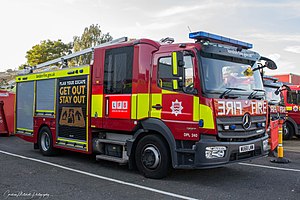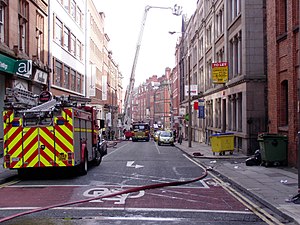
Back Gwasanaethau tân ac achub y Deyrnas Unedig Welsh Feuerwehr in Großbritannien German Servicio de bomberos en el Reino Unido Spanish Pompier au Royaume-Uni French Fire services in the United Kingdom SIMPLE 英国消防机构 Chinese


The fire services in the United Kingdom operate under separate legislative and administrative arrangements in England and Wales, Northern Ireland, and Scotland.
As of 2023, emergency cover is provided by 49 fire and rescue services (FRS) in the UK.[1] The older terms of fire brigade and fire service survive in informal usage and in the names of a few organisations. England and Wales have local fire services which are each overseen by a fire authority, which is made up of representatives of local governments. Fire authorities have the power to raise a Council Tax levy for funding, with the remainder coming from the government. Scotland and Northern Ireland have centralised fire services, and so their authorities are effectively committees of the devolved parliaments. The total budget for fire services in 2014-15 was £2.9 billion.[2]
Central government maintains national standards and a body of independent advisers through the Chief Fire and Rescue Adviser, which was created in 2007, while His Majesty's Inspectorate of Constabulary and Fire & Rescue Services provides direct oversight. The devolved government in Scotland has a similar agency, HMFSI Scotland.
Firefighters in the United Kingdom are allowed to join unions, the main one being the Fire Brigades Union, while chief fire officers (the heads of the various FRS) are members of the National Fire Chiefs Council (formerly the Chief Fire Officers Association), which has some role in national co-ordination.[3]
The fire services have undergone significant changes since the beginning of the 21st century, a process that has been propelled by a devolution of central government powers, new legislation and a change to operational procedures in the light of terrorism attacks and threats.
- ^ "A Beginners Guide to UK Geography (2023)". Open Geography Portal. Office for National Statistics. 24 August 2023. Retrieved 9 December 2023.
- ^ "UK Government spending" (PDF). p. 69.
- ^ "About the NFCC". National Fire Chiefs Council. Retrieved 8 May 2021.